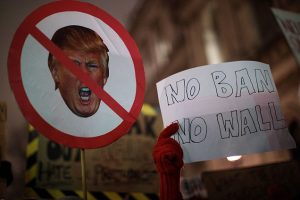Ninth Circuit Articulates Best Argument Against The Travel Ban Yet
The ruling is on 'hold,' but if SCOTUS wants to knock down the Travel Ban, the Ninth showed them how.

(Photo by Jack Taylor/Getty Images)
As I’ve said repeatedly, Donald Trump’s most recent travel ban, Travel Ban 3.0, is the closest he’s come to a Constitutional expression of xenophobia and bigotry. The first two bans were a legal mess, discriminatory and stupid on their faces. But the latest one has a patina of legalism to it. If it’s going to be okay to do this, Travel Ban 3.0 explains how.
But, if I may quote a proverb from a long time ago in a galaxy far, far away: “Darkness rises, and the light to meet it.”

Early Adopters Of Legal AI Gaining Competitive Edge In Marketplace
Faced with the most serious attempt to effectuate a ban Muslims based on their country of origin, the Ninth Circuit unleashed its most thorough opinion against the ban. And guys, they totally Marybury v. Madison’d this one. They went for total legal jiu-jitsu, using the government’s strength against the government.
The Ninth Circuit found that the government absolutely has the authority to issue Travel Ban 3.0, THROUGH AN ACT OF CONGRESS. But it found that the President, through executive order, was tightly bound by the Immigration and Nationality Act. The court found that Travel Ban 3.0 exceeded the president’s authority. The Atlantic breaks down the opinion really well:
The government’s argument is that one section of the Act, § 1182(f), gives the president virtually unlimited authority to ban any group of immigrants…
The court does not question the statute, but it denies that the Travel Bans conform to it: first, it argues, the president did not make any legally significant “finding” that the entry of travelers under 3.0 would be “detrimental” to U.S. interests; second, Trump did not “suspend” entry, but imposed an indefinite ban; third, Trump issued the ban to circumvent, not implement, the system of terrorist screening Congress had dictated; and, fourth, Congress in a separate statute has explicitly forbidden the executive to discriminate (in issuing immigrant visas at least) on the basis on nationality.
Here is the heart of the argument. The court reasons that Congress, elsewhere in § 1182, set out permitted ways for the executive to exclude possible terrorists and protect the U.S. when foreign countries don’t provide information the U.S. needs to screen applicants. The statute provides nine different specific security-related grounds for exclusion, including a provision barring an alien “who has engaged in a terrorist activity.” The statute also has sections governing countries that don’t share information needed to assess visa applications. These provisions are the choices Congress made in this area. It would make little sense, the opinion suggests, to read 1182(f) as wiping them out by giving the president the power to suspend entry of any immigrants anywhere anytime because—well— because terrorism is bad or information is good.
You should go on and read the entire Atlantic piece on this Ninth Circuit’s ruling; it’s really good. It goes on to discuss how the Supreme Court could easily follow this line of argument, if it is so inclined to strike down the Travel Ban while preserving the government’s theoretical authority to ban Muslims.
Sponsored

The Business Case For AI At Your Law Firm


Legal AI: 3 Steps Law Firms Should Take Now

Navigating Financial Success by Avoiding Common Pitfalls and Maximizing Firm Performance

Navigating Financial Success by Avoiding Common Pitfalls and Maximizing Firm Performance
It has become crucially important to find a way to dispose of this bigoted ban, while still preserving the government’s authority to do so… because for whatever reason, conservative judges are REALLY INTO the government having the power to be bigoted towards Muslims. From where I sit, that’s a strange and depressing hill to die on. But, as Richard Posner tried to explain to me in this More Perfect podcast, in matters of national security there are some judges who favor an ultimate, almost pusillanimous deference to the president.
Of course, the Travel Ban, no version of it, is really about national security. It’s about Donald Trump promising a “total and complete shutdown of Muslims entering the United States,” and his administration putting that campaign bigotry into action. Judges have to know — they simply MUST EFFING KNOW BY NOW — that any allowance of this Travel Ban will immediately result in Trump tweeting out that he fulfilled his promise on a “MUSLIM BAN.” They most know that Trump himself thinks of this policy in those terms, that he thinks using the phrase “Travel Ban” is just some politically correct BS to “fool” the courts.
If they uphold this ban, Trump is going to make the Supreme Court look like racist fools. History will record that the five conservatives on the Court were racist fools. Maybe that doesn’t matter to Thomas, Alito, and Gorsuch. Roberts and Kennedy have repeatedly failed to just put a stop to this foolishness. But the Ninth Circuit at least told Roberts and Kennedy how to stop the Muslim Ban without impinging on Congress’s power to ban “travel.”
Will those two take the Ninth Circuit up on their offer? Their legacies depend on it.
The Supreme Court’s Travel Ban Off-Ramp [The Atlantic]
Sponsored

Early Adopters Of Legal AI Gaining Competitive Edge In Marketplace

Is The Future Of Law Distributed? Lessons From The Tech Adoption Curve
Elie Mystal is the Executive Editor of Above the Law and the Legal Editor for More Perfect. He can be reached @ElieNYC on Twitter, or at elie@abovethelaw.com. He will resist.







